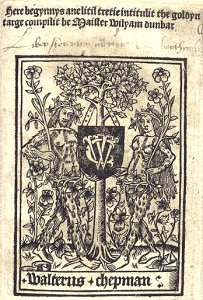Introduction
.jpg)

The Goldyn Targe
.jpg)
.jpg)

.jpg)
Dunbar was a Scottish poet, or makar,
active in the late 15th and early 16th Centuries.
He was probably a native of East Lothian, as assumed from a satirical reference in the Flyting of Dunbar and Kennedie, where it is also hinted that he was a member of the noble house of Dunbar.
Dunbar first appears in the historical record in 1474 as a new student, or determinant, of the Faculty of Arts at the University of St. Andrews. Since the customary age for entering a Scottish university at that time was 14, a birth date of 1459 or 1460 has been assumed.
At Saint Andrews, he earned a bachelor’s degree in 1477 and a master’s degree in 1479. Details from his later life suggest he was ordained as a priest at some point, but the date is unknown.
In 1491 and 1492, Dunbar accompanied an embassy to Denmark-Norway and France in an unknown capacity. In 1501 and 1502 he participated in an embassy to England on the staff of Bishop Andrew Forman of Moray.
From 1500, Dunbar served as Court Poet to James IV of Scotland, and produced a large body of work in Scots. It is in this period that the bulk of his poetry is dated.
Several pieces were in honor of great events of state. For example, his short work To the Princess Margaret marked the arrival of Margaret of England into Scotland and the extended allegory The Thrissil and the Rois commemorates her marriage to King James.
His poetry was not limited to commemorative works. It ranged from devout religious pieces such as The Tabill of Confession through meditations such as the Lament for the Makars to entertainments typified by the notorious Flyting with Kennedy and satires including The Fenyeit Freir of Tungland.
A number of his works of the time are personal petitions to the king, asking for favors, often requesting that he be appointed to an office in the church, referred to by Dunbar as a benefice.
Several poems entitled To the King are typical.
Several of Dunbar’s poems were included in the Chepman and Myllar prints of 1508, the first books to be printed in Scotland.
In 1510, his annual pension was set at £80 Scots. In comparison, Dunbar’s contemporary, Hector Boece, received an annual salary of £26,13s Scots for his role as Principal of King’s College, Aberdeen.
The last reliable reference to Dunbar is in the Treasurer’s Accounts for May 1513, where he is recorded receiving a payment of his pension. James IV died at Flodden in September of the same year.
In the dislocation that followed, the Treasurer’s accounts cease for a period and, when resumed in 1515, Dunbar is no longer recorded as being employed by the crown.
A poem, Quhen the Governour Past in France, describing the departure of the Regent Albany for France in 1517, is attributed to Dunbar in the Maitland Manuscripts, suggesting he was still active at that time. But in David Lyndsay’s 1530 The Testament and Complaynt of the Papyngo, Dunbar is referred to as being deceased. The exact date of his death remains unknown.